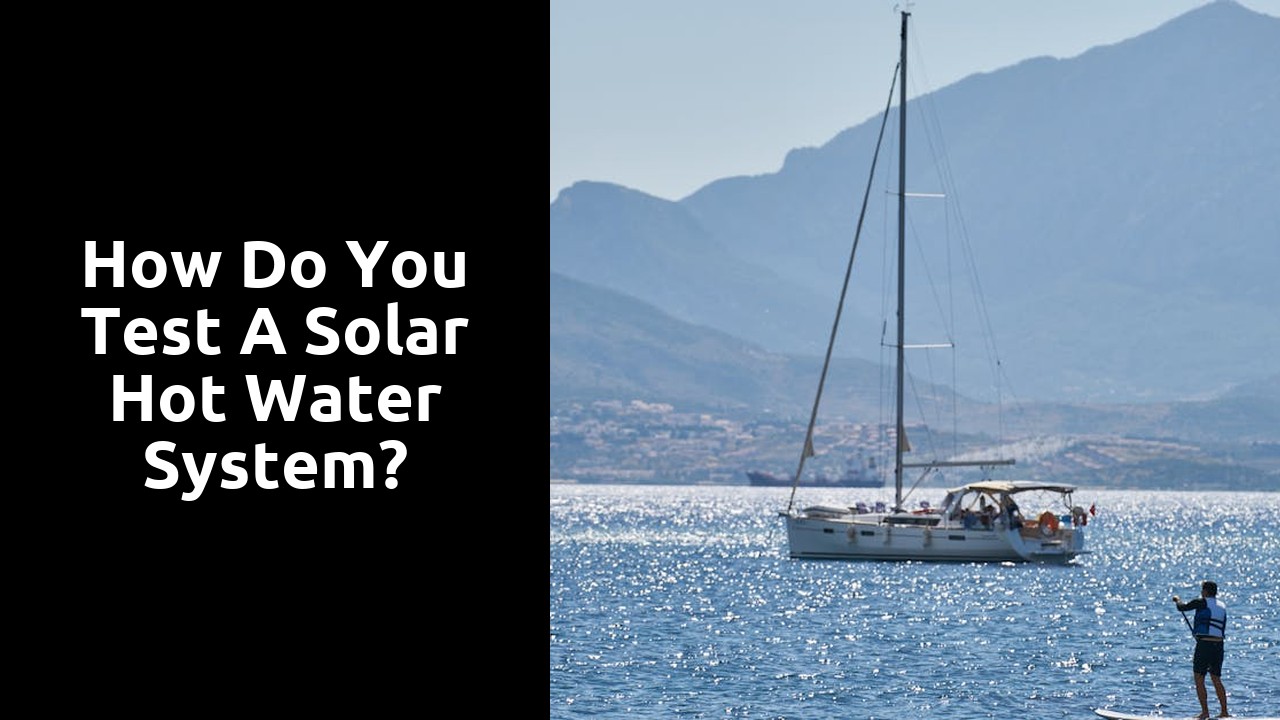
Government rebates and incentives for solar hot water system replacement
When considering the replacement of a solar hot water system, it is crucial to explore the numerous government rebates and incentives available in Australia. These financial assistance programs aim to encourage the adoption of more sustainable energy solutions by making the initial investment more affordable for homeowners. By taking advantage of such rebates, individuals can significantly reduce the overall cost associated with installing a new solar hot water system. It is recommended that homeowners consult with relevant authorities to inquire about the eligibility criteria for these incentives, ensuring that their replacement project complies with the stipulated guidelines. Additionally, individuals may be required to undergo Solar Hot Water System Inspections to qualify for certain rebates and incentives, highlighting the importance of adhering to regulatory standards and operational requirements.
Eligibility criteria for financial assistance
To be eligible for financial assistance for the replacement of a solar hot water system in Australia, applicants must meet certain criteria. Firstly, applicants need to ensure that the existing system being replaced is at least five years old. Additionally, the old system must be permanently disconnected from power and water sources before applying for financial aid. Furthermore, applicants are required to provide proof that the new solar hot water system meets the relevant Australian Standards and guidelines. This confirmation is generally obtained through Solar Hot Water System Inspections conducted by qualified professionals.
Moreover, it is essential for applicants to provide accurate documentation related to the purchase and installation of the new system. This documentation typically includes proof of payment, invoices reflecting the cost of purchase and installation, as well as receipts for any additional work carried out, if applicable. Failure to provide all necessary documentation may result in delays or even rejection of the application for financial assistance. Applicants should also be aware that specific requirements and procedures may vary between different states and territories in Australia.
Impact of location on the cost of replacing a solar hot water system
The location where a solar hot water system is to be replaced can significantly impact the overall cost of the project. Factors such as accessibility to the site and any required site preparations can add expenses to the total replacement cost. In some cases, the need for additional work, such as modifications to the existing plumbing or electrical systems, due to the location of the system can also affect the final price. Solar hot water system inspections should be conducted to assess the specific requirements of the location and determine any potential complications that could arise during the replacement process.
Furthermore, the cost of replacing a solar hot water system may vary based on the location's proximity to service providers and availability of materials. Remote locations may incur higher transportation costs for equipment, parts, and labor, ultimately increasing the overall expense of the replacement. Considering the impact of location on the cost of replacing a solar hot water system is crucial in budgeting for the project and ensuring that all necessary factors are taken into account to achieve a successful and cost-effective replacement process.
Accessibility and site preparation requirements
When considering the replacement of a solar hot water system in Australia, one must take into account the accessibility and site preparation requirements. Accessibility plays a crucial role in determining the ease of installation and the overall cost of replacing the system. Residential properties with limited access may require additional labor and equipment, potentially increasing the overall expense of the replacement. Site preparation is essential in ensuring that the new system can be installed efficiently and function optimally. Clearing the area around the installation site and ensuring that there is adequate space for the system are vital steps in the process. Solar hot water system inspections are often conducted prior to replacement to assess the existing conditions and identify any potential challenges that may arise during the installation process.
Additionally, the location of the property can also impact the accessibility and site preparation requirements for replacing a solar hot water system. Rural or remote locations may pose logistical challenges due to limited access to specialized equipment and skilled labor. In such cases, additional costs may be incurred to transport materials and personnel to the site. Conversely, properties located in urban areas with easy access to utilities and services may have lower site preparation requirements, contributing to a more straightforward replacement process. It is crucial for homeowners to consider these factors when planning for the replacement of their solar hot water system to ensure a smooth and cost-effective installation process.
Comparison of costs between different types of solar hot water systems
When considering the costs of replacing a solar hot water system, it is essential to evaluate the various types available in the market. The expense of installing a solar hot water system can differ significantly based on the type chosen. For instance, a solar hot water system that includes a rooftop collector is generally less expensive to install compared to a system with evacuated tubes. It is important for homeowners to weigh the initial cost against factors such as efficiency, durability, and the long-term savings provided by each type of system.
In addition to the type of solar hot water system selected, the overall expenses can also be influenced by factors such as maintenance costs and operational efficiency. Systems with higher upfront costs may prove to be more cost-effective over time if they require less maintenance and are more energy-efficient. Hence, before choosing a solar hot water system, conducting thorough research, seeking advice from professionals, and potentially considering Solar Hot Water System Inspections can help in making an informed decision that aligns with both budget constraints and long-term sustainability goals.
Efficiency and longevity of the system
When considering the efficiency and longevity of a solar hot water system, regular maintenance and upkeep are essential. It is recommended to schedule routine Solar Hot Water System Inspections to ensure optimal performance and longevity of the system. These inspections can help identify any potential issues early on and prevent costly repairs in the future. Additionally, regular servicing can help maintain the efficiency of the system, ensuring that it continues to operate at its best capacity.
Furthermore, the longevity of a solar hot water system greatly depends on the quality of the system chosen and how well it is maintained over time. Investing in a high-quality system and adhering to a regular maintenance schedule can significantly extend the lifespan of the system. Understanding the manufacturer's recommendations for maintenance and following them diligently can help maximise the longevity of the solar hot water system, providing you with cost-effective and sustainable hot water solutions for years to come.
FAQS
How much does it typically cost to replace a solar hot water system?
The cost of replacing a solar hot water system can vary depending on factors such as the type of system chosen, installation requirements, and location. On average, you can expect to pay anywhere from $3,000 to $7,000 for a new system.
Are there any government rebates or incentives available for replacing a solar hot water system?
Yes, there are government rebates and incentives available for replacing a solar hot water system in Australia. These can help offset the cost of the new system and make it more affordable for homeowners.
What are the eligibility criteria for financial assistance when replacing a solar hot water system?
To be eligible for financial assistance when replacing a solar hot water system, homeowners may need to meet certain criteria such as income thresholds, property ownership requirements, and specific installation standards. It is recommended to check with the relevant authorities for detailed information.
How does the location impact the cost of replacing a solar hot water system?
The location can impact the cost of replacing a solar hot water system due to factors such as accessibility, site preparation requirements, and local installation regulations. Homes in remote areas or with challenging terrain may incur higher installation costs compared to urban areas.
What are the efficiency and longevity considerations when comparing costs between different types of solar hot water systems?
When comparing costs between different types of solar hot water systems, it is important to consider factors such as system efficiency, longevity, maintenance requirements, and ongoing savings on energy bills. While some systems may have a higher upfront cost, they could offer better efficiency and longer-term savings in the future.
